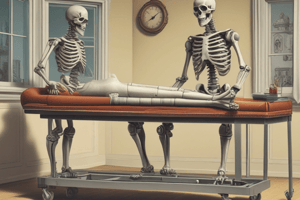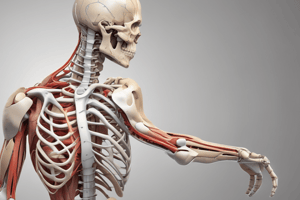Podcast
Questions and Answers
What is the result of the Alar ligament test?
What is the result of the Alar ligament test?
- Not performed
- Inconclusive
- Negative (correct)
- Positive
What is indicated by the presence of pain on the left side during right-sided movements of the cervical spine?
What is indicated by the presence of pain on the left side during right-sided movements of the cervical spine?
- Cervical spine instability
- Thoracic outlet syndrome
- Cervicogenic headache
- Vertebrobasilar insufficiency (correct)
What is the degree of left lateral flexion of the cervical spine?
What is the degree of left lateral flexion of the cervical spine?
- 30 degrees
- 20 degrees
- 45 degrees (correct)
- 60 degrees
What is the posture observed in the patient?
What is the posture observed in the patient?
What is the result of the Sharp Purser test?
What is the result of the Sharp Purser test?
What is the degree of right rotation of the cervical spine?
What is the degree of right rotation of the cervical spine?
What is the strength of the left elbow flexion?
What is the strength of the left elbow flexion?
What is the posture of the thoracic spine observed in the patient?
What is the posture of the thoracic spine observed in the patient?
What is the average FRT ROM in healthy individuals?
What is the average FRT ROM in healthy individuals?
What is the primary purpose of the Cranial Cervical Flexion Test (CCFT)?
What is the primary purpose of the Cranial Cervical Flexion Test (CCFT)?
What is a common symptom associated with cervicogenic headaches?
What is a common symptom associated with cervicogenic headaches?
How is the C0-C1 (AO joint) physiological motion assessed?
How is the C0-C1 (AO joint) physiological motion assessed?
What is a possible source of cervicogenic headaches?
What is a possible source of cervicogenic headaches?
What is the goal of the Cranial Cervical Flexion Test (CCFT)?
What is the goal of the Cranial Cervical Flexion Test (CCFT)?
What is a common finding in individuals with cervicogenic headaches?
What is a common finding in individuals with cervicogenic headaches?
How is the patient positioned during the Cranial Cervical Flexion Test (CCFT)?
How is the patient positioned during the Cranial Cervical Flexion Test (CCFT)?
What is the recommended age range for cervical spine myelopathy diagnosis?
What is the recommended age range for cervical spine myelopathy diagnosis?
Which muscle is used to test the C5 nerve root?
Which muscle is used to test the C5 nerve root?
What is the typical presentation of a patient with neck pain and headaches?
What is the typical presentation of a patient with neck pain and headaches?
What is the primary purpose of the cranial cervical flexion test?
What is the primary purpose of the cranial cervical flexion test?
Which test is used to assess the flexibility of the upper quarter muscles?
Which test is used to assess the flexibility of the upper quarter muscles?
What is the typical presentation of a patient with neck pain and radiating pain?
What is the typical presentation of a patient with neck pain and radiating pain?
What is the primary purpose of the Spurling maneuver?
What is the primary purpose of the Spurling maneuver?
What is the recommended initial examination procedure for a patient with neck pain and radiating pain?
What is the recommended initial examination procedure for a patient with neck pain and radiating pain?
What is the primary purpose of the deep neck flexor test?
What is the primary purpose of the deep neck flexor test?
What is the typical finding in a patient with cervical spine myelopathy?
What is the typical finding in a patient with cervical spine myelopathy?
Flashcards are hidden until you start studying
Study Notes
Observation and Posture
- Forward head posture with bilateral shoulder protraction and increased thoracic kyphosis, and decreased lumbar lordosis.
Clearing Tests
- Vertebral/Basilar Artery: pain with right-sided movements on the left, no dizziness.
- Alar ligament: negative.
- Sharp Purser & Transverse cruciate ligament (Ligament of Life Test): negative.
- Clearing (scanning) - Shoulder: clear.
- Thoracic spine clearing: clear.
- TMJ: clear.
Palpation
- Moderate tenderness to palpation in the left cervical paraspinal region, most notably at C5-C6.
Neurological Screening
- Reflexes: bilateral - biceps 2+, brachioradialis 2+, triceps 2+.
- Dermatomes: intact C1 – T2 (light touch).
- Myotomes: normal C1 – T1 except for left shoulder abduction and left elbow flexion.
Range of Motion (ROM)
- Cervical flexion: 15 degrees, moderate limitation, with pain on the left side (6/10).
- Cervical extension: 60 degrees, full ROM, no pain with and without overpressure.
- Left lateral flexion: 45 degrees, full ROM, no pain with and without overpressure.
- Right lateral flexion: 20 degrees, moderate limitation, with pain on the left side (6/10).
- Left rotation: 70 degrees, full ROM, no pain with and without overpressure.
- Right rotation: 25 degrees, moderate limitation, with pain on the left side (6/10).
Manual Muscle Testing (MMT)
- All motions of the upper limb are 5/5 except left elbow flexion and left shoulder abduction 4/5.
- Left upper trapezius: 4/5.
- Left middle trapezius: 4/5.
- Left lower trapezius: 3+/5.
- Right upper, middle, lower trapezius muscles are 5/5.
- Grip Strength: Right dominant: normal, Left: normal.
Muscle Length
- Normal FRT ROM in healthy individuals is 44°, indicating some limitation of ROM at C1-2 and a possible source for cervicogenic headaches.
C1-C2 Rotation Assessment
- The therapist can ask the patient to nod their head while maintaining a neutral spine.
- Another method is to have the patient rotate their head in one direction and then instruct them to perform a capital nod, comparing the amount of capital nod with the head and neck rotated in the opposite direction.
Clinical Findings for Diagnosis of Cervical Spine Myelopathy
- Long-standing neck pain (>12 weeks).
- Abnormal/substandard performance of the CCFT.
- Abnormal/substandard performance of the deep flexor endurance test.
- Coordination, strength, and endurance deficits of neck and upper quarter muscles.
- Flexibility deficits of upper quarter muscles.
- Ergonomic inefficiencies with performing repetitive activities.
Studying That Suits You
Use AI to generate personalized quizzes and flashcards to suit your learning preferences.




